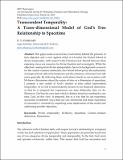Transcendent temporality : a trans–dimensional model of God’s free relationship to spacetime
Abstract
This paper looks at several key motivations behind the prisoner of time objection and a view against which it is leveled, the Oxford School of divine temporality, with respect to the Christian God. Shared between these opposing views are concerns for divine freedom and sovereignty. While the objection, coming from divine atemporalists, has in its background a concern for the creator–creature distinction, the Oxford School prizes the authenticity of temporal God–talk in the Scriptures and the coherency of human God–talk more generally. By following these motivations closely in conversation with M–theory discussions about the nature of time as a dimension of spacetime, I propose a new model of God’s relation to time called transcendent temporality. In it, God is transcendently present in our temporal dimension, so that he is temporal but experiences our time differently than we do. Moreover, God has his own time which is distinct from but correlated to our time. God, on this view, is temporal, but in a way that he can experience succession in different ways than our one–directional and linear experience of succession. I conclude by unpacking some implications of this model and addressing possible objections.
Citation
Everhart , D T 2021 , ' Transcendent temporality : a trans–dimensional model of God’s free relationship to spacetime ' , TheoLogica , vol. 5 , no. 1 . https://doi.org/10.14428/thl.v5i1.57883
Publication
TheoLogica
Status
Peer reviewed
ISSN
2593-0265Type
Journal article
Collections
Items in the St Andrews Research Repository are protected by copyright, with all rights reserved, unless otherwise indicated.

